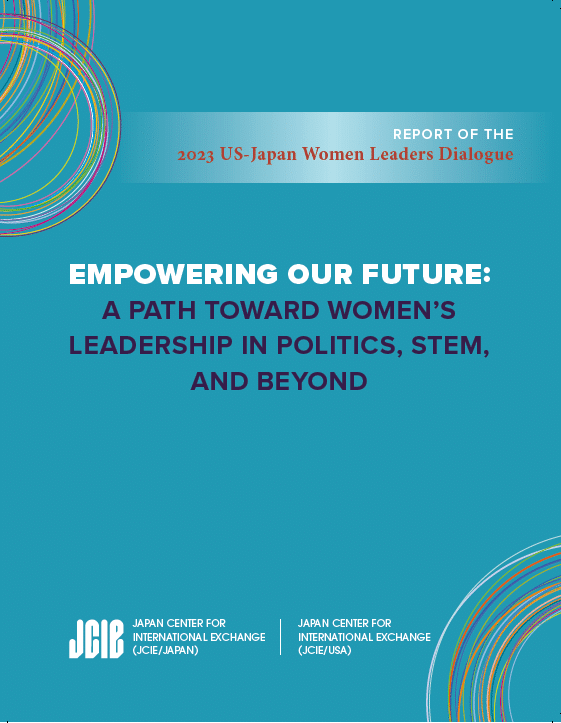This report offers findings and recommendations from the 2023 US-Japan Women Leaders Dialogue. The program brought a delegation of six women leaders—four Diet members and two business executives—from Japan to Washington DC for a weeklong series of high-level briefings and discussions. Organized by the Japan Center for International Exchange (JCIE/Japan and JCIE/USA), this was the fourth US-Japan Women Leaders Dialogue.
The delegation arrived in Washington DC on September 11, 2023, for a weeklong series of dialogues that allowed them to engage with approximately 130 people from government, business, academia and think tanks, nonprofit organizations, and the media. These conversations covered everything from trade, security, and politics to education and the arts, with an underlying theme of gender equity informing many of the sessions.
A highlight of the week was the US-Japan Women in STEM Roundtable on Capitol Hill. The event built on the findings of our 2022 Dialogue, which pointed to STEM (science, technology, engineering, and mathematics) as an area offering the greatest room for growth for women in terms of well-paying and flexible jobs. The Roundtable brought together roughly 40 American and Japanese experts from various sectors to discuss the many shared challenges, as well as some notable differences, between women’s experiences in STEM-related careers in academia, business, and government in the United States and Japan, and what can be done by the United States and Japan, both individually and together, to empower women in STEM fields.
KEY RECOMMENDATIONS
Below is a sampling of the recommendations that emerged from the dialogue. For the full findings and recommendations, download the report.
US-Japan cooperation on women in politics
- Promote exchanges on best practices in training and mentorship for aspiring female politicians.
- Support joint research and dialogues on effective ways to address gender-based online abuse and harassment of women policymakers and candidates.
US-Japan cooperation on women in the workforce
- Support comparative analyses and sharing of data on public and private sector policies designed to create inclusive workplaces and address the gender pay gap.
- Jointly examine how each country is working to provide accessible and affordable childcare and long-term care, and to “care for the caregivers.”
- Conduct joint studies of the impact of parental leave policies and of reproductive health rights on women’s career trajectories.
US-Japan cooperation on women in international relations & WPS
- Implement/expand bilateral and multilateral commitments to address gender issues—e.g., US-Japan-ROK cooperation/exchanges to promote women’s economic participation.
- Coordinate closely with allies and partners to ensure women are at the table in discussions on peacebuilding and post-conflict reconstruction.
- Foster dialogue and collaboration to promote comprehensive strategies and frameworks for implementing women, peace and security (WPS) principles.
US-Japan cooperation on women in STEM
K-12 level
- Increase opportunities for students living in Japan and the US who are interested in STEM to interact online or through in-person exchanges.
- Provide US and Japanese public-school teachers with resources and opportunities to learn from peers implementing effective active learning and inquiry-based learning in their classrooms (in-person or virtual exchanges).
University level
- Conduct joint studies of best practices on (1) hiring to recruit and retain women faculty in STEM; and (2) inclusive curriculum in STEM learning for undergraduate/graduate students and continuing education for women who want to join the STEM workforce.
- Create a government- or privately funded endowment to provide scholarships and grants to promote US-Japan study abroad and collaborative research opportunities for women in STEM.
STEM business and entrepreneurship
- Promote the strategic planning of career paths and roles and share best practices in both countries, for example in the area of skills-based hiring practices.
- Compare and analyze the impact of US and Japanese government and industry initiatives such as quotas and reporting requirements on corporate and investor behavior.
- Encourage collaboration to provide continuing education with a focus on reskilling programs for women that enable them to keep up with and take advantage of rapid changes in technology.
- Explore joint alternative funding and access to non-capital resources for women entrepreneurs in STEM fields.
By Kimberly Gould Ashizawa

